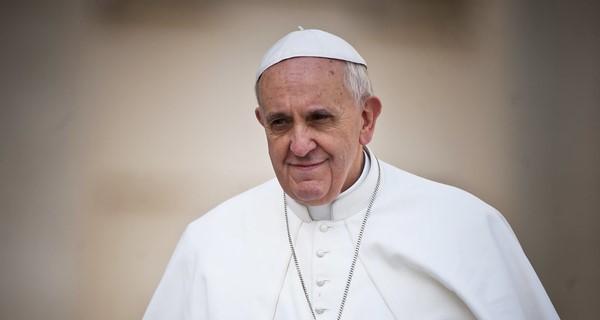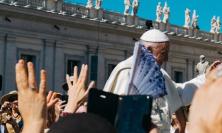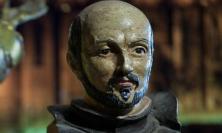Photo shared via Creative Commons CC BY-NC-ND 2.0
It was with great sadness that we learned of the death of Pope Francis on 21 April 2025. Three friends of Thinking Faith - Brian McClorry SJ, Thomas Flowers SJ and Gemma Simmonds CJ - tell us who Pope Francis was to them.
The joyful pessimist - Brian B. McClorry SJ
In the sixteenth century, a group of friends, including Ignatius of Loyola, met over some days and decided to found what became the Society of Jesus, the Jesuits. Since the group was eventually clear about their desire, faute de mieux, to go wherever the pope sent them, they might have been quite shocked at the idea of one of their number becoming pope. However, their way of deciding whether or not to form a religious order was distinctive. It involved periods of individual prayer, after which the group met and carefully listened to one another. This procedure lasted for several days and was indeed a ‘discernment’ – an open and creative approach with a fine attentiveness to the Holy Spirit and to one another.
The early Jesuits-to-be took time to pray, speak and listen. Several centuries later, Pope Francis’ ‘synodal pathway’ has a recognisably similar shape, but on a larger, worldwide scale; it is for the Church as a whole. The pathway, too, emerges as an invitation to ‘discern’ – to find the best approach in particular circumstances. This is rather more than discriminating between what is good and not good. As a ‘discernment of spirits’, which involves praying, speaking and listening, it resembles the approach of the early companions.
In 2016, Pope Francis told an informal gathering at the 36th Jesuit General Congregation that, as a person, he was pessimistic. But he was helped, he said, by how the discernment of spirits in Ignatius’s Spiritual Exercises gave importance to ‘consolation’ – joy, joy in the Spirit. This certainly fits with the titles of his documents – ‘The joy of the Gospel’ (2013), ‘The joy of love’ (2016), ‘Rejoice and be glad’ (2018) and ‘Christ is alive’ (2019). A remarkable series of titles for a pessimist…
‘Discernment’ is key in the Exercises, which Pope Francis – as Jorge Mario Bergoglio SJ – would have made twice during his years as a Jesuit. He told that same General Congregation that the Society always needed to develop, to keep searching for whatever was ‘most helpful’. This was not a static affair with final conclusions: ‘The Society initiates processes and leaves spaces’. Ignatius’s Exercises have to do with finding the best space. They provide ‘rules for discernment’, which look like ways of understanding, at least to some extent, what God is about here. Like the synodal pathway, they are about discovery as well as discrimination.
One prayer, usually printed at the end of the Exercises, is the ‘Contemplation About Love’ – or, in most translations, to ‘attain’ love, which may sound overly active and reward-conscious. However, it is a prayer, a contemplation of God not only present but also ‘labouring’, as Ignatius puts it, in all of creation – including the person praying. This contemplation is at one with Pope Francis’ very real ecological concern.
Pope Francis’ many experiences throughout his life, including his papacy, had to do with constant efforts to discern and act well. His Jesuit background had an important role to play; it mattered in all his experiences of life and work. May he now live in that promised peace beyond understanding.
Brian B. McClorry SJ is a member of the Corpus Christi Jesuit community in Boscombe.
The easy conversationalist - Thomas Flowers SJ
Towards the end of the first year of his pontificate, Pope Francis canonised Pierre Favre, one of the first Jesuit companions. Favre had been beatified by Pope Pius IX in 1872, but his cause had stalled there. Pope Francis forwent the usual procedures in order to move forward Favre’s canonisation. Thereby the first Jesuit pope not only drew the Church’s attention to this sixteenth-century friend of St Ignatius of Loyola who was known as a master of the Spiritual Exercises, but he revealed something of himself and his own desires to serve the Church. It was once said of Favre by a fellow Jesuit that, ‘God conveyed this grace to him: that in every conversation, in banquet halls and inns, and in the courts of princes, that good man proffered the good treasure of his heart . . . pleasantly accomplishing and moving forward the business of Christ without any tedium or annoyance’. (Otto Braunsberger SJ [ed.], Beati Petri Canisii, Societatis Iesu, Epistulae et acta, vol. 8 [Freiburg im Breisgau: Herder, 1896], p.125. The original letter is in Latin; the translation is my own.) Everywhere he went, Favre poured himself out, revealing his faith and his love without distinction, at ease in whatever conversation he thought might lead his listeners closer to Christ.
In April 2023, emerging from the hospital where he had just undergone treatment for bronchitis, Pope Francis found himself faced with a typical throng of reporters and faithful eager for his attention. Amid these, there was a young couple who had lost their five-year-old daughter at the hospital the night before. Captured on the cameras of the media, Francis is told by an aide about the couple, and in an instant the clicking shutters and the questions of the crowd around him seem to fade away, as he reaches out to cradle the head of the sobbing mother, whispering words that only she hears. Still embracing her, he reaches out his hand to the father. In the moment, nothing else seemed to matter to the pope but the pain of the people before him. He wanted to be with them and for them to know that Christ was present amid their suffering.
It was encounters like these that revealed who Pope Francis was, and how he desired to serve the Church. Indeed, the great liturgical actions and formal addresses of his papacy never expressed who he was as clearly as his tender gestures and unscripted words. To the delight of some and the consternation of others, he was unfailing conversational. He had an unadorned way of speaking and, when spoken to, he listened. In his apostolic exhortation, Evangelii gaudium, he wrote of the need to regard others with a ‘loving attentiveness [that] is the beginning of a true concern for their person [and] which inspires me effectively to seek their good’ (§199). In his words and deeds, he demonstrated that he was the recipient of God’s loving attention, and that he desired to lavish his own attention on others so that they, too, might know the tender care of the God of Jesus Christ. Like his patron St Pierre Favre, he moved easily among people of all sorts, pouring out his love without distinction, at ease in every conversation that might lead the people he encountered closer to Christ.
Thomas Flowers SJ is assistant professor of Ignatian formation in the College of Philosophy and Letters at Saint Louis University and teaches Jesuit history and spiritualty to Jesuits in formation.
The humble listener - Gemma Simmonds CJ
In March 2013, as the Church prepared for the conclave to elect the next successor to St Peter after Pope Benedict’s surprise resignation, I wrote:
The modern Church has become dangerously top-heavy through the increasing centralisation of power. Despite the personal sanctity and right intentions of the post-conciliar pontiffs, the abuse of power has flourished throughout its structures. A different approach to authority is what the Church needs now.
At the time, I suggested that we might do worse than to look at the religious orders, and my words proved prescient. Looking back on his papacy, and especially on his calling of the synod on synodality, Pope Francis certainly took a hatchet to any notion that power in and of itself is something to be sought and exercised for its own sake. He made a clear distinction between power and authority, and also made clear that authority could and should be sought wherever God plants it. His own personal style in private and in public could often be a deliberate dismantling of the pomp and circumstance of the Vatican’s predilection for la bella figura.
He made clear that the poor should be seen and heard as agents of their own change, at least insofar as having their perspective taken seriously when it comes to seeking solutions to global poverty. He decried the disproportionate extent to which the poor pay for the climate disaster brought on the world by the increasingly rapacious economies of countries already wealthy in comparison.
Looking now at the synod and how it played out, I’m again struck by why I thought at that time that having a religious as pope was a good idea:
A pope with a deep-seated instinct for consultation and consensus, such as is found among the mendicant and monastic orders, would perhaps be more likely to take seriously Vatican II’s implicit and explicit teaching on subsidiarity. This would mean allowing local churches their proper level of self-determination and including widespread consultation of experts on the ground […] as a normative part of decision-making processes. It would mean having structures of governance that are more transparent, accountable and inclusive […] In religious life the decision-making processes are predicated on the notion that discernment is a gift given not only to individual leaders but to the body as a whole, made up of all its members, whether those mandated to govern or play a specific spiritual role, or the ordinary members. […] To introduce this method would be a great gift to the Church, where it often feels as if the wisdom and experience of the lay faithful, especially women, the young and those considered marginal in some way is ignored by those in charge of making decisions.
All accounts of the synod that I have read or heard from those who attended its sessions speak powerfully of the difference it made when those normally without a voice in the Church were listened to with the same level of respect and attention as members of the hierarchy and theological or other experts. Pope Francis made space for the invisible and the silent to be seen and heard. Their presence echoes powerfully within the teaching of Laudato si’, Querida Amazonia, Fratelli tutti and elsewhere. A former student who, since those days, has become a trans male, spoke recently with immense appreciation of the kindness and welcome he received from Pope Francis. This was echoed in a recent radio interview by a gay Chilean man who had been sexually abused by a priest as a child. Initially he received Francis’ apology for the errors of judgement he had made in dealing with the Chilean situation. This led to a friendship based on the pope’s simple personal interest, conveyed by regular telephone calls during lockdown in which, among other things, he reportedly told terrible ‘dad jokes’. That slow build-up of trust and friendship mirrors Francis’ sense of the time it takes to come to a new understanding and to build a solid relationship based on reconciliation. His ecumenical and interfaith relationships did more in laying down the ground for serious steps in unity than many grandiose theological and ecclesiological pronouncements. In Evangelii gaudium he states that: ‘Progress in building a people in peace, justice and fraternity depends on four principles related to constant tensions present in every social reality.’ (§221) These principles are that: time is greater than space; unity prevails over conflict; realities are more important than ideas; and the whole is greater than the part.
We can see these principles underlying many of his statements and the pastoral decisions that he took or orientations that he proposed. We can also see them behind decisions which he didn’t take as quickly or as far as many wished that he had, such as going further with his implied support of the return of divorced Catholics to the reception of Communion, of same-sex unions and of the opening of the diaconate to women. He had his own reasons, which were not echoed by all members of the synod, for going slowly on some of these neuralgic issues which have been left to his successor to take forward or not, as time will prove. His words of encouragement were not always accompanied by a practical sense of making his words a reality. This was the case when he urged religious sisters subject to the abuse of power by clerics to fight back. The words were welcome, but the reality of the sisters’ context in some parts of the world render such words bitterly ironic when the wherewithal to fight is simply not available. These were times when Francis’ rhetoric proved empty without structural change. But it equally echoed his sense that some problems can only be resolved by local solutions.
There will be those who will breathe a sigh of relief now, thinking that the unfortunate interlude is over and we can go back to ‘normal’. There are certainly plenty of people within and outside the institutions of Rome who looked askance at Francis’ casual waving aside of Vatican protocol and the deference which they believe is their and the Church’s due. Francis may have sat lightly to the trappings of his office, but he was no populist on the lookout for easy adulation from the crowds. He had an acute sense of the Church having grown distant from the experience and concerns of the millions of ordinary people who make up the body of Christ. He also had a typically Jesuit feel for evangelisation that leads to genuine transformation. He wanted to see faith grow in a way that would make a concrete difference to the lives of individuals and of societies, with a transformative kingdom-orientation to all social relationships. It remains to be seen if he managed to set the barque of Peter on a course from which it can no longer be diverted. What is undoubtedly true is that, during his pontificate, many outside the Church looked at its head and found there a friend, a fellow faithful seeker for the common good and a pastor whose concern for others went far beyond the confines of his own flock.
The most powerful image of his pontificate, for me, was the night in March 2020 when he stood, a lonely and vulnerable figure in front of St Peter’s in the cold and pouring rain, and offered the world an extraordinary Urbi et Orbi blessing at the height of the Covid-19 pandemic. I can think of no more powerful and Christ-like a way to convey what he understood by his office. It spoke volumes of his humility, his resilience and his courage as he called upon the Church and the world to have faith in God’s loving concern. For me, that image will be his legacy.
Gemma Simmonds CJ is Director of the Religious Life Institute and Senior Research Fellow at the Margaret Beaufort Institute of Theology.






